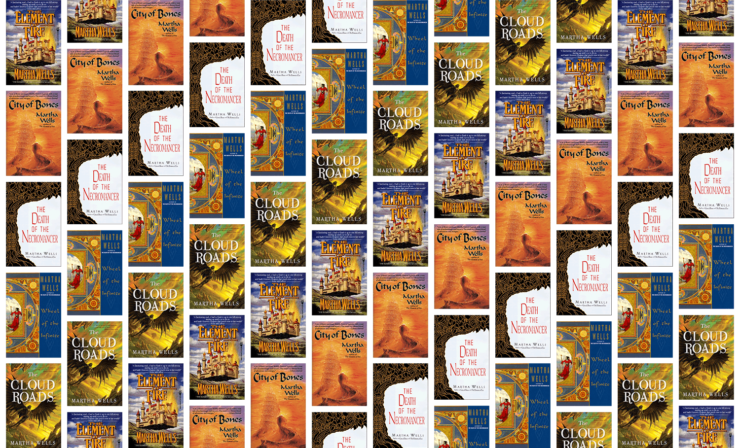Martha Wells’ bestselling Murderbot works are justly famous. Given their instant popularity, it’s possible that some fans, new to her works, may have assumed that the first Murderbot book, All Systems Red, must have been the author’s publishing debut. Not so.
In fact, Wells’ debut novel, The Element of Fire, appeared in 1993. To put that in terms grognards might better understand, by this point in their careers, Poul Anderson had just published A Knight of Ghost and Shadows, while Lois McMaster Bujold was about to publish Penric’s Demon.
This is, of course, good news! If you are only familiar with Well’s Murderbot books, know that there are plenty more Wells books to read. Allow me to suggest five Martha Wells books that Murderbot fans might like.
The Element of Fire (1993)
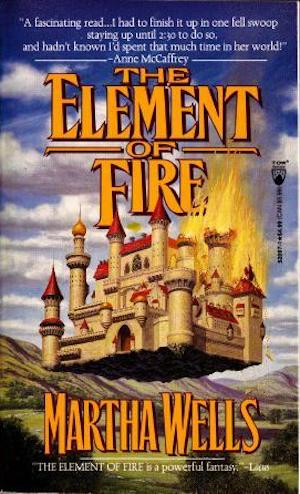
Old King Fulstan of Il-Rien died little mourned and was succeeded by his legitimate heir, Roland. While not as unpleasant as Fulstan, King Roland is a disappointment. Roland is all too easily swayed, in particular by his toxic favourite Denzil, Duke of Alsene. The weak, foolish king does nothing to defend the realm against threats military and magical; indeed, he’s a weak point in the defenses. Defense falls to the court: the dowager queen, the queen, various ministers, and gentleman adventurer Thomas Boniface.
The pressing threat: Urbain Grandier, late of theocratic Bisra. He has a very bold plan and heads an alliance composed of traitors and compulsive backstabbers. His primary targets are those who wronged him in Bisra. However, a side-effect of his plan will be the immiseration of Il-Rien. His scheme must be stopped.
The king’s bastard sister, princess Katherine Fontainon, now known as Kade Carrion, could play a central role in the effort to confound Grandier. However, Kade has grudges of her own; whether she values Il-Rien more than her resentment against the crown is a very interesting question. Boniface must discover the answer.
City of Bones (1995)
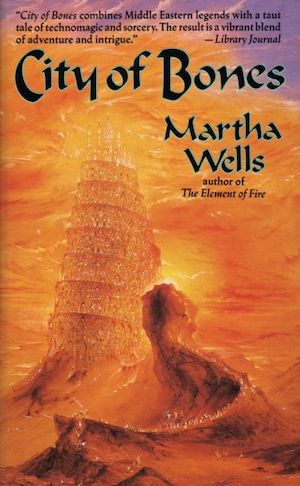
Had he any choice in the matter, guide Khat would not accept employment from a scholar like Elen, since Khat suspects Elen will kill him as soon as Khat’s usefulness is ended. However, a despised non-human krisman like Khat, living in a desolate post-apocalyptic world, has a hard time finding jobs. Elen’s offer is unpalatable but irresistible.
Their party is ambushed by bandits; Elen’s guards perish. Elen and Khat must rely on each other to reach the abandoned ancient citadel and solve its archaeological mysteries. Neither Elen nor Khat is comfortable with this forced trust. Elen is an archaeologist and determined to delve into ancient (dangerous!) mysteries. Khat has been drawn, willy-nilly, into a quest that may well reprise the apocalypse that scoured the ancient world.
The Death of the Necromancer (1998)
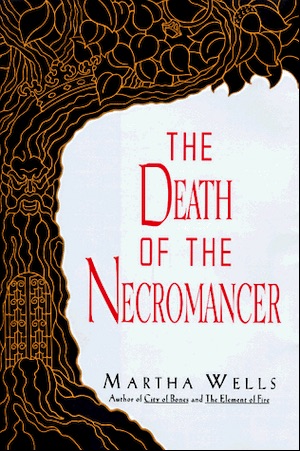
The rules of the aristocrat Nicholas Valiarde’s game are simple. Assisted by a diverse team of criminals, Valiarde (also known as master thief Donatien) will do his best to punish Count Montesq for orchestrating the trumped-up conviction and execution of Valiarde’s beloved godfather Edouarde. Brilliant master-detective Inspector Ronsarde and his faithful assistant Doctor Halle will do their best to capture Donatien. Montesq will no doubt do his best to avoid justice, formal or informal. All that remains is to determine which of the three will be most successful.
A fourth party is nowhere on Valiarde’s menu. The new player has a name—Doctor Octave!—but what skills Doctor Octave brings to the board are unclear, as are his goals. If Octave is not a necromancer himself, one of his allies definitely is. Whoever the necromancer is, they know that Valiarde is aware of their necromantic dabbling. Valiarde therefore finds himself in a brand-new game: staying alive long enough to deal with the sorcerer who has targeted Valiarde for death.
The Wheel of the Infinite (2000)
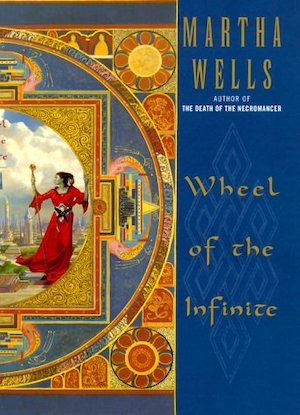
The Celestial Empire believes itself the centre of the universe (as have many real-world empires). In this case, the claim is true. The fate of the world depends on the empire’s sacred mountain. Rituals performed there reshape the universe. Thus, when the Hundred Year Rite, in which the Wheel of the Infinite is redrawn and harmony ensured, repeatedly goes wrong, it is not merely embarrassing. It is potentially catastrophic.
The Celestial One turns to Maskelle, the former Voice of the Adversary, for succor. Years ago, Maskelle blotted her copybook rather badly, thus the exile from which she must be summoned home to Duvalpore. However, she has a unique and useful set of skills, skills that may reveal the malefactors behind the sabotaged rite and thus save the empire and its world. Or, if she repeats the errors of the past, doom everything.
The Cloud Roads (2011)
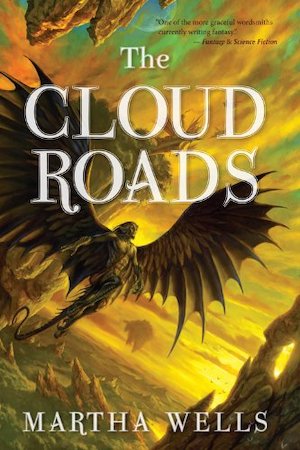
There are several intelligent species in the Three Worlds. Orphaned Moon never learned what kind of person he is. What he does know is that he is a shapeshifter, and that his winged form bears a passing resemblance to a Fell. The Fell are aggressive and ravenous; they have driven several civilizations into collapse; they are universally hated.
When Moon shapeshifts, he is tagged as Fell and driven out of whatever tribe he has joined. It doesn’t matter that he has done nothing wrong; he is seen as a threat.
So it is with his latest attempt at joining a tribe. His neighbors spy his winged form and are ready to drive him out…perhaps even kill him.
Enter Stone, who saves Moon. Stone knows exactly what Moon is—not a Fell, but a Raksura—and Stone has a use for Moon. Raksura are divided into castes and Moon, a consort-caste Raksura, would fill a valuable niche in Indigo Cloud Court. Moon could finally find an accepting community and a useful role…but there are a few problems. Not only is the court is divided against itself, the Fell are poised to attack and destroy it.
***
Martha Wells has written more than five non-Murderbot books, from standalones like City of Bones and Wheel of the Infinite to the Books of the Raksura series and other works set in The Death of the Necromancer’s world of Ile-Rien. As I am limited to the canonical five, I can’t discuss them all here. If any Wells fans have Wells books and stories they want to recommend, the comments are below.
In the words of Wikipedia editor TexasAndroid, prolific book reviewer and perennial Darwin Award nominee James Davis Nicoll is of “questionable notability.” His work has appeared in Publishers Weekly and Romantic Times as well as on his own websites, James Nicoll Reviews and the Aurora finalist Young People Read Old SFF (where he is assisted by editor Karen Lofstrom and web person Adrienne L. Travis). He is a four-time finalist for the Best Fan Writer Hugo Award, is eligible to be nominated again this year, and is surprisingly flammable.










